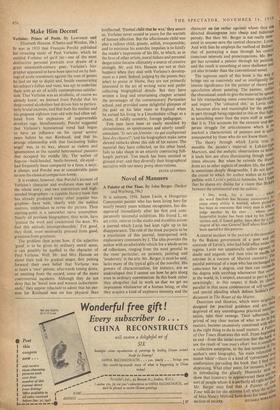Make Him Decent
Verlaine: Prince of Poets. By Lawrence and
Elisabeth Hanson. (Chatto and Windus, 30s.) IT was in 1933 that Francois Porchd published his revealing study of Paul Verlaine, which he entitled Verlaine tel qu'il fut—one of the most destructive personal portraits ever drawn of a great nineteenth-century . poet. Verlaine's bio- grapher appeared to have been spurred on by feel- ings of acute resentment against the man of genius he had set out to depict and, beside enumerating his subject's follies and vices, was apt to underline them with an air of acidly contemptuous satisfac- tion. That Verlaine was an alcoholic, of course we already knew; we learned from Porchd that his deep-rooted alcoholism had driven him to particu- larly brutal excesses, and that both his mother and his pregnant eighteen-year-old wife had often suf- fered from his explosions of ungovernable drunken rage. Simultaneously, Porchd suggested that Verlaine's homosexual trend had begun to have an influence on his career several years before he met Rimbaud, and that his strange relationship with that fascinating 'fallen angel' was, in its way, almost as violent and ignominious as the squalid heterosexual passions that occupied his middle life. The author of Sagesse—bald-headed, beetle-browed, slit-eyed- !lad frequently been compared to a faun, a satyr, a silenus; and Porchd was at considerable pains to ram the classical comparison home.
It is evident, however, that Porchd'S account of Verlaine's character and evolution does not tell the whole story; and two industrious and high- minded biographers —a capable literary team that has already produced many other popular bio- graphies—have now, clearly with the noblest motives, undertaken to revise the picture. Their starting-point is a somewhat naive assumption. Nearly all previous biographers, they write, have `praised the work and condemned the *Ian. We find this attitude incomprehensible.' For good, they think, must necessarily proceed from good, greatness from greatness.
The problem then arises how, if the adjective 'good' is to be given its ordinary moral sense, it can possibly be applied to the character of Paul Verlaine. Well, Mr. and Mrs. Hanson set about their task by gradual stages, first putting forward their own belief that Verlaine was at heart a 'nice' person; afterwards toning down, or omitting from the record, some of the more controversial incidents. Although they do not deny that he 'loved men and women indiscrimin- ately,' they appear reluctant to admit that his pas- sion for Rimbaud was no less physical than intellectual. 'Eternal child that he was,' they assure us, Verlaine never ceased to yearn for the warmth of human affection. But the affectionate child was also a callous child, greedy, selfish, irresponsible; and to minimise his anarchic impulses is to falsify the reader's impression of his life, in which, as in the lives of other artists, moral failure and personal desperation became ultimately a source of creative strength. Mr. and Mrs. Hanson are not at their happiest when they deal with Verlaine's develop- ment as a poet. Indeed, judging by the poems they select to praise or blame, they are not primarily interested in the art of writing verse and prefer collecting biographical details. But they have written a long and entertaining chapter around the personages of the contemporary Parnassian school, and provided some delightful glimpses of the poet on his later visits to England when he earned his living in a Lincolnshire village as a chaste, if mildly eccentric, foreign pedagogue.
Few men have been so easily moulded by circumstance, so spontaneous and utterly unself- conscious. 'Je rids un feniinin—ce qui expliquerait bien des choses!!; 'and his biographers make some shrewd remarks about this side of his nature. The material they have collected, on the other hand, fails to take shape in an entirely convincing full- length portrait. Too much has been omitted or glossed over; and they diversify their biographical narrative with too many prosy observations.
PETER QUENNELL






































 Previous page
Previous page